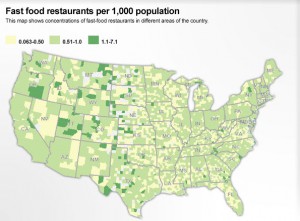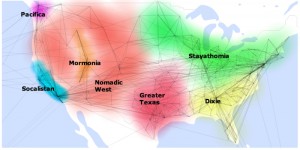We did it here first, I think, but Edible Geography has definitely done it better.
Nibbles: EoL, Mixed farming, Conservation medicine, Indicators, Vitamin A, Hamburger, Rewilding, Tejate
- Did you know the Encyclopedia of Life does crop wild relatives?
- Smallholders with mixed crop and livestock systems are the key to it all. My mother-in-law says: I agree.
- Deforestation is bad for the health.
- 2010 Biodiversity Indicator Partnership launches National Biodiversity Indicators Portal.
- Aussies trial a new, secret orange spud. Yeah I can really see that being a huge success.
- The McItaly kerfuffle rumbles on. Much like your stomach after you’ve eaten one.
- The “rewilding” kerfuffle rumbles on. Much like those herds of wildebeest roaming majestically across the Great Plains.
- Rewilding an ancient pre-Hispanic drink. Ooops, I guess that should be reviving.
Connecting Mexican and Islamic cooking
Is mole… “an ingenious Mexican version of curry, or is curry a Hindu adaptation of a Mexican sauce?”
Good question.
Mapping the fast food culture
Amid all the hype about Michelle Obama’s blitz on child obesity, USDA has come out with an interactive Food Environment Atlas, which has been much commented on in the blogosphere. Here’s what the distribution of fast food restaurants in the US looks like:

Coincidentally, Pete at PeteSearch has mined Facebook profile data and come up with this visualization of the connections among users:

Is it me, or there a coincidence between the maps? Here’s one of the things Pete says about the Nomadic West:
Starbucks is almost always the top fan page, maybe to help people stay awake on all those long car trips they must be making?
Geography is destiny?
Nibbles: Vet, Pastoralists, Eggplant, US food map, Mexican food, Poultry, Maize, GMOs
- What’s it like being the only vet in a country? The BBC tells us.
- The CBD on how to be a good pastoralist.
- James does a mini-roundup of the India GM brinjal to-do.
- Mapping the fast food culture.
- Mexico wants Unesco to recognize culinary traditions. As if tamales were in danger of extinction. Didn’t France ask for the same last year?
- Heirloom chickens don’t taste like chicken.
- Deconstructing the cultural significance of the colour of corn.
- “GM crops: still not a panacea for poor farmers.” In other news, still no cure for cancer.